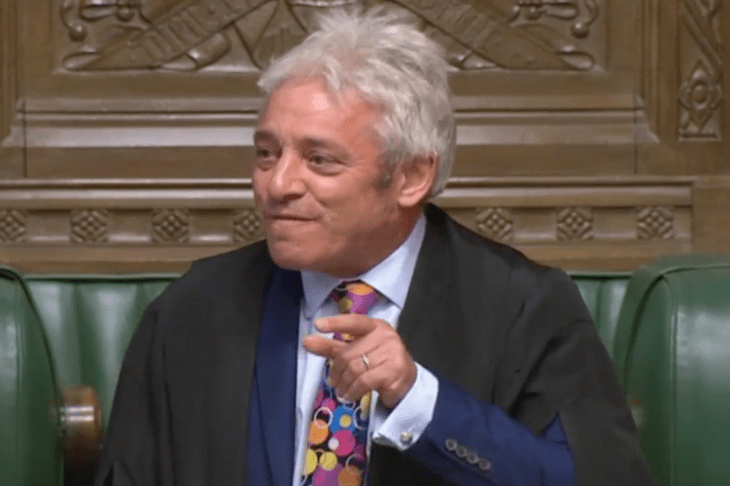Whatever happens in this evening’s election vote, John Bercow will not be the House of Commons Speaker come 1 November. The Speaker announced his plans to quit in the Chamber this afternoon to a mixed reception from MPs. Bercow said he had promised his family he would not stand for re-election and planned to stick by the promise:
‘At the 2017 election, I promised my wife and children that it would be my last. This is a pledge that I intend to keep. If the House votes tonight for an early general election, my tenure as Speaker and MP will end when this Parliament ends.
If the House does not so vote, I have concluded that the least disruptive and most democratic course of action would be for me to stand down at the close of business on Thursday, October 31.’
As for when Bercow will depart his role as Speaker. He said that if MPs vote for an early election this evening, he will go as soon as Parliament ends. However, should the government’s bid for an early election fail again, he plans to remain in post until 31 October. He argued that this was fair on the grounds that the votes on the Queen’s Speech the government plans to present the week before, would require an experienced Speaker. Bercow’s decision to stand down comes as the Tories planned to break with convention and run a candidate against him at the next election.
Bercow also found time to deliver a parting shot at his critics (many of whom sit on the government benches). He said that he had always sought to be the champion of the backbenchers. He warned that ‘we degrade this parliament at our peril’ and praised those MPs who act in the national interest – ‘not as delegates, but as representatives’:
‘This is a wonderful place filled overwhelmingly by people who are motivated by their notion of the national interest, by their perception of the public good and by their duty, not as delegates, but as representatives, to do what they believe is right for our country.’
As for his replacement, Bercow said the appointment of his successor should be carried out before the next election as newly-elected MPs might find themselves being ‘unduly influenced’ by party whips – the current intake were more likely to be independent minded. This has worried some Tory MPs who view it as an attempt by Bercow to increase the chance of a partisan pro-EU replacement being selected.
On hearing the news, MPs were divided. Opposition MPs stood up to applaud Bercow while the bulk of Conservative MPs remained seated. Several of the Conservative Brexit rebels who lost the whip last week applauded Bercow. The different responses serve as a reminder of Bercow’s divisiveness. The role of Speaker is supposed to be a neutral one. Some of Bercow’s biggest supporters don’t even pretend he is neutral. After Bercow was embroiled in bullying allegations, Margaret Beckett was one of the Labour MPs who rallied behind him staying in place on the grounds of Brexit: ‘the most difficult decision we’ve made for hundreds of years trumps bad behaviour’. Bercow’s interpretation of certain conventions and when to overturn them has only added to this view.
As William Lenthall told Charles I, the Speaker of the Commons has ‘neither eyes to see not tongue to speak in this place but as this House is pleased to direct me’. The neutrality of an office once lost is hard to get back. The question is: will Bercow’s eventual successor be able to restore neutrality?







Comments